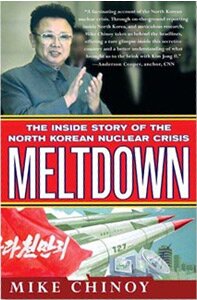Mike Chinoy speaks on the North Korea Nuclear Crisis
September 25, 2008
 Starting in 2001, North Korea’s nuclear weapons program went from being frozen to being fully operational, culminating in the test of a nuclear weapon in October 2006 that shocked the world. U.S. policy towards North Korea during this period was marked by intense debate in Washington, as advocates of diplomacy struggled with proponents of a more confrontational approach to dealing with Pyongyang. Today, a reversal by the Bush Administration of its earlier policy has led to an agreement that has put North Korea’s nuclear program into a state of partial disablement. However, the Six-Party Talks are stalled, and some believe the talks may yet unravel. How did all of this happen? Who were the key actors in this nuclear drama and what roles did they play resolving—or contributing to—this crisis?
Starting in 2001, North Korea’s nuclear weapons program went from being frozen to being fully operational, culminating in the test of a nuclear weapon in October 2006 that shocked the world. U.S. policy towards North Korea during this period was marked by intense debate in Washington, as advocates of diplomacy struggled with proponents of a more confrontational approach to dealing with Pyongyang. Today, a reversal by the Bush Administration of its earlier policy has led to an agreement that has put North Korea’s nuclear program into a state of partial disablement. However, the Six-Party Talks are stalled, and some believe the talks may yet unravel. How did all of this happen? Who were the key actors in this nuclear drama and what roles did they play resolving—or contributing to—this crisis?
 Longtime CNN correspondent Mike Chinoy, author of Meltdown: The Inside Story of the North Korean Nuclear Crisis (St Martin’s Press, 2008), will share the perspective he has gained from more than two hundred interviews with key players in Washington, Seoul, Tokyo and Beijing—including Colin Powell, John Bolton and Kim Dae-jung—as well as fourteen trips to Pyongyang. Chinoy will discuss how U.S. refusal to engage in serious diplomacy spurred Kim Jong Il to stage his nuclear breakout, and describe the subsequent reversal of course that led the Bush administration to abandon confrontation in the hope of negotiating an end to the nuclear crisis.
Longtime CNN correspondent Mike Chinoy, author of Meltdown: The Inside Story of the North Korean Nuclear Crisis (St Martin’s Press, 2008), will share the perspective he has gained from more than two hundred interviews with key players in Washington, Seoul, Tokyo and Beijing—including Colin Powell, John Bolton and Kim Dae-jung—as well as fourteen trips to Pyongyang. Chinoy will discuss how U.S. refusal to engage in serious diplomacy spurred Kim Jong Il to stage his nuclear breakout, and describe the subsequent reversal of course that led the Bush administration to abandon confrontation in the hope of negotiating an end to the nuclear crisis.
Download a full transcript of Mike Chinoy’s lecture.
Summary:
Mike Chinoy, who launched his book Meltdown, detailed the shift in U.S. policy toward North Korea during President George W. Bush’s administration. He explained how the infighting between the hardliners and engagers within the Bush administration shaped the policy towards North Korea. He illustrated how in the years when Cheney, Rumsfeld, and other hardliners had Bush’s ear, the policy towards North Korea was antagonistic. When key hardliner personnel stepped down and others faded away, engagers took the stage and policy followed suit. He gives a lot of credit for the policy shift to the work done by Assistant Secretary of State, Christopher Hill, and the influence Secretary Rice had on President Bush. And throughout the administration, Chinoy remarked that within the bureaucracy both sides often withheld information from one camp in order to advance their agenda.
Chinoy also took the perspective of the Kim Jong Il and the North Korean regime. He explained what seemingly irrational and provocative actions by North Korea were actually actions taken for regime survival. And that contrary to popular believes North Korea was willing and ready to negotiate, but the Bush administration missed the cues. Consequently, Chinoy emphasized that, the U.S. could have avoided North Korea’s nuclear breakout.
He concluded with the current deadlock of the Six-Party negotiation process. The U.S. and North Korea had come to a divergence on the sequencing of steps. North Korea had been reversing its disablement of the Yongbyon reactor because the U.S. had not delisted them; while, the U.S. had not delisted North Korea because they had not agreed to verification steps. In the end he believes, North Korea will become the world’s eighth nuclear power. (Summary by Mike Yo, Korea Studies, SAIS.)
Mike Chinoy joined the Pacific Council on International Policy in Los Angeles in July, 2006 as the Edgerton Fellow in Korean Security, focusing on security issues in North Korea, China and Northeast Asia. He previously spent 24 years as a foreign correspondent for CNN, including eight years as the network’s first bureau chief in Beijing, bureau chief in Hong Kong, and, from 2001-2006, senior Asia correspondent.
Chinoy is the author of the acclaimed book China Live: People Power and the Television Revolution, and has received numerous awards for his journalism, including the Emmy, Peabody, and Dupont awards for his coverage of the 1989 Tiananmen Square crisis, and a Dupont Award for his coverage of the tsunami. He holds a B.A. from Yale University and an M.S. from Columbia University.



